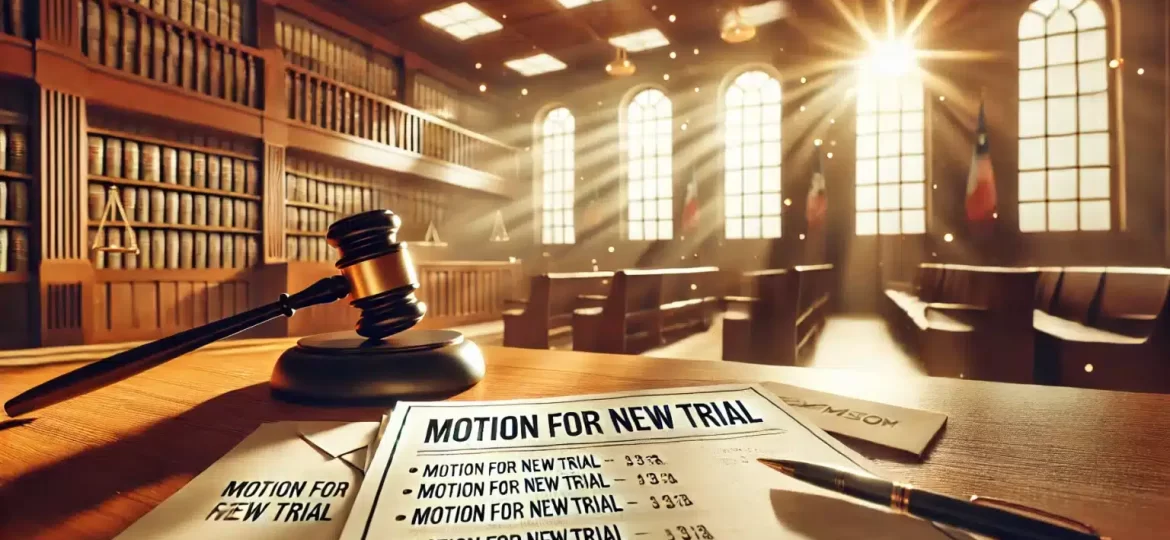
In the realm of legal proceedings, the resolution of a case in court doesn’t always mark the definitive end. There exist mechanisms that allow for reconsideration or reevaluation of a judgment or final order. Two primary avenues for such post-judgment remedies are the Motion for New Trial and the Motion for Reconsideration.
What are the grounds for a Motion for New Trial?
The grounds for a Motion for New Trial are:
- Fraud, Accident, Mistake or Excusable negligence which ordinary prudence could not have guarded against and by reason of which, the aggrieved party has probably been impaired in his rights; or
- Newly discovered evidence, which he could not, with reasonable diligence, have discovered and produced at trial, and which if presented, would probably alter the result.
What are the grounds for a Motion for Reconsideration?
The following are the grounds for moving for reconsideration:
- The damages awarded are Excessive;
- That the evidence is Insufficient to justify the decision or final order; or
- That the decision or final order is Contrary to law.
How shall a motion for new trial or reconsideration be made?
It shall be made by:
- Filing a motion in writing stating the ground or grounds therefor; and
- Serving a written notice of motion on the adverse party.
What must be the form and contents of a motion for new trial or reconsideration?
- The motion shall be made in writing stating the ground or grounds therefor; and
- written notice of which shall be served by the movant on the adverse party.
How shall the grounds for a motion for new trial be proved?
A party seeking a new trial must prove the motion as specified for such proofs. If the motion is based on fraud, accident, mistake, or excusable negligence, the moving party must support it with affidavits detailing the merits, which the opposing party can rebut with their own affidavits.
Conversely, if the motion is based on newly discovered evidence, the moving party must support it with affidavits from the witnesses expected to present the evidence, or by duly authenticated documents that they intend to introduce as evidence.
What shall a motion for reconsideration state?
A motion for reconsideration shall point out specifically the findings or conclusions of the judgment or final order which:
- Are not supported by the evidence; or
- Which are contrary to law making express reference to the testimonial or documentary evidence, or to the provisions of law alleged to be contrary to such findings or conclusions.
What is the effect of filing a motion for new trial or reconsideration which does not comply with the requirements regarding the same?
It shall be considered a pro forma motion. A pro forma motion for new trial or reconsideration shall not toll the reglementary period of appeal.
Within what period should the motion for new trial and/or reconsideration be filed?
The period to file shall be within the period for taking an appeal of the decision.
What is the Fresh Period Rule?
Where the motion for new trial or reconsideration is denied, the movant shall have a fresh period within which to file his appeal of the judgment or final order. The “fresh period” is 15 days counted from the receipt of the order denying the motion for new trial or for reconsideration. The new 15-day period may be availed of only if either a motion for new trial or motion for reconsideration is filed; otherwise, the decision becomes final and executory after the lapse of the original appeal period provided in the rules.1
Is the Fresh Period Rule applicable to administrative proceedings?
As a rule, the “fresh period rule” applies only to judicial appeals and not to administrative decisions when the specific administrative rules of procedure explicitly exclude it. However, if an administrative body’s rules of procedure do not explicitly prohibit the application of the fresh period rule—such as when they allow for it and state that the Rules of Court apply supplementarily—then the fresh period rule can be applied. What prevails in administrative cases is the period provided.2
Is the Fresh Period Rule applicable to criminal cases?
Yes, it equally applies to the period for appeal in criminal cases under Section 6 of Rule 122 of the Rules of Court.3
Does the Fresh Period Rule apply to the petition for certiorari under Rule 64?
The Fresh Period Rule does not apply to the petition for certiorari under Rule 64 of the Rules of Court.4
May a second motion for new trial be allowed?
Yes. A second motion for new trial, based on a ground not existing nor available when the first motion was made, may be filed within the time herein provided excluding the time during which the first motion had been pending.
May a second motion for reconsideration be allowed?
No party shall be allowed a second motion for reconsideration of a judgment or final order.
Source:
The Rules of Court
- Neypes v. Court of Appeals, G.R. No. 141524, September 14, 2005 ↩︎
- Puerto del Sol Palawan, Inc, v. Gabaen, G.R. No. 212607, March 27, 2019 ↩︎
- Yu v. Samson-Tatad, G.R. No. 170979, February 9, 2011 ↩︎
- Fortune Life Insurance Company, Inc, v. COA Proper, G.R. No. 213525, January 27, 2015 ↩︎


